Until 11 days after the debate, no one in the press covered this important, bipartisan debate and I am told a leader of the church that hosted the event decided absurdly and inexcusably to not release the recording. With two frontrunners losing by 12-14 points to Larry Hogan, Democratic Party organizations failing to coordinate on either publicity/promotion or decent recordings being made publicly available, and a negligent media grossly undercovering this primary, it seems if I don’t light a fire under the ass of this whole primary process nobody else will and we will likely be handing Republicans the retiring Ben Cardin’s U.S. Senate seat in Maryland held by Democrats for 37 years since 1987. Changing course does not have to mean abandoning Trone or Alsobrooks as candidates (though it may come to that), but at the very least we need a third person shake things up, truly challenge them, and maybe even offer a third alternative. I’m the only person who can come even close to doing this among the second-tier candidates, so if you want a Democrat to win November, I need your support now and will explain why in detail below.
Yes, I am using my own news website to promote my candidacy and ideas I am putting forth as a candidate for U.S. Senate for Maryland and I won’t apologize for it!
By Brian E. Frydenborg (Twitter @bfry1981, Threads @bfchugginalong, LinkedIn, Facebook, Substack with exclusive informal content) March 26, 2024; *UPDATE April 8: Afro News finally posted coverage of the March 21 eleven days later on April 1; Brian was quoted more than Alsobrooks; see related articles: March 19 Frydenborg Holds His Own Against Alsobrooks in Baltimore Maryland U.S. Senate Democratic Primary Debate, but Will It Matter & Why Won’t Local Media Cover this Race Properly?, March 6 Maryland U.S. Democratic Primary Debate Raises Questions on Frontrunners’ & Party’s Readiness to Take on Hogan. Can Frydenborg Emerge As Third Option?, and March 2 Petty Feuding Between Trone and Alsobrooks Does Not Honor Ben Cardin’s Legacy. Vote for Me Instead! and see all of Brian’s Maryland U.S. Senate race coverage here; because of YOU, Real Context News surpassed one million content views on January 1, 2023, but I still need your help, please keep sharing my work and consider also donating! Real Context News produces commissioned content for clients upon request at its discretion. Correction appended: this article earlier misstated the length of Sen. Mikulski’s Senate term.
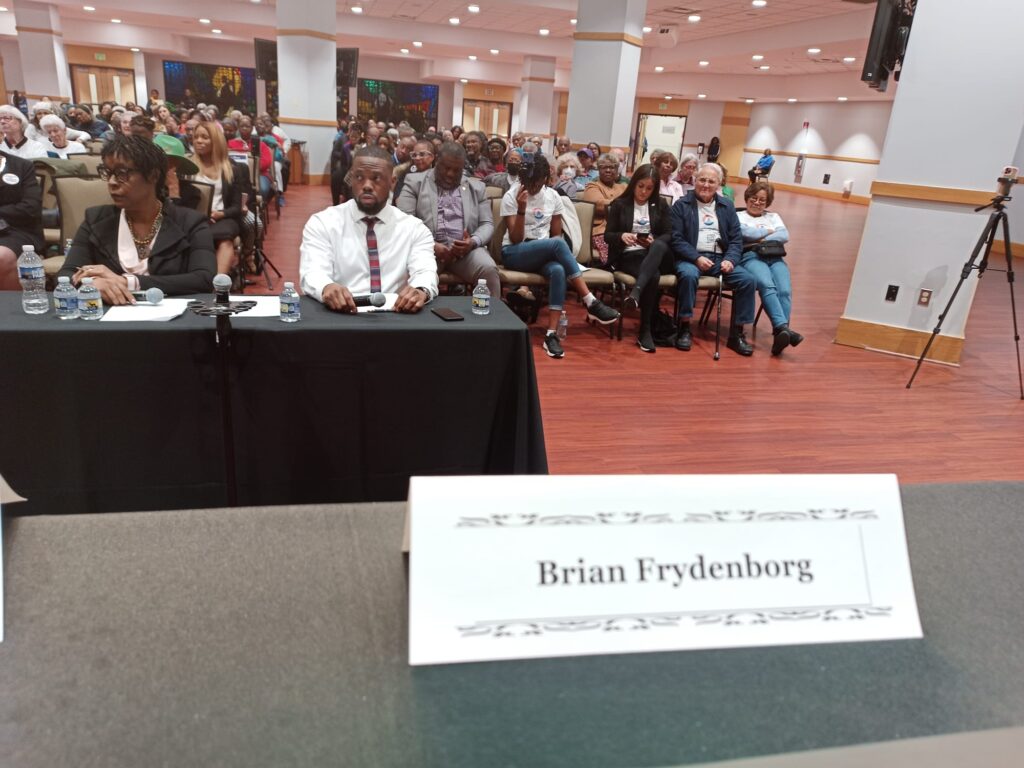
SILVER SPRING—To paraphrase what I wrote recently after my second Maryland U.S. Senate Democratic primary debate, if a debate happens but is not covered by the media, did it really happen as far as voters are concerned?
I am afraid the answer is no.
A Candidate Failed by this Maryland Primary Process
I write now as a candidate perhaps cheated by history in gross fashion, but in a way we may never know fully or be able to quantify to what degree. To start, I would like reiterate the facts of the only credible independent poll to come out in 2024 at the time it was released, the mid-February Emerson College/The Hill/DC News Now poll:
For the Maryland Democratic U.S. Senate primary:
- Undecided 37%
- U.S. Representative David Trone 32%
- Prince George’s County Executive Angela Alsobrooks 17%
- and all other candidates combined (including me) totaling 14%.
For the general election:
- Trone tied with Hogan at 42% with 16% undecided
- Alsobrooks down 37% to Hogan’s 44% and 19% undecided
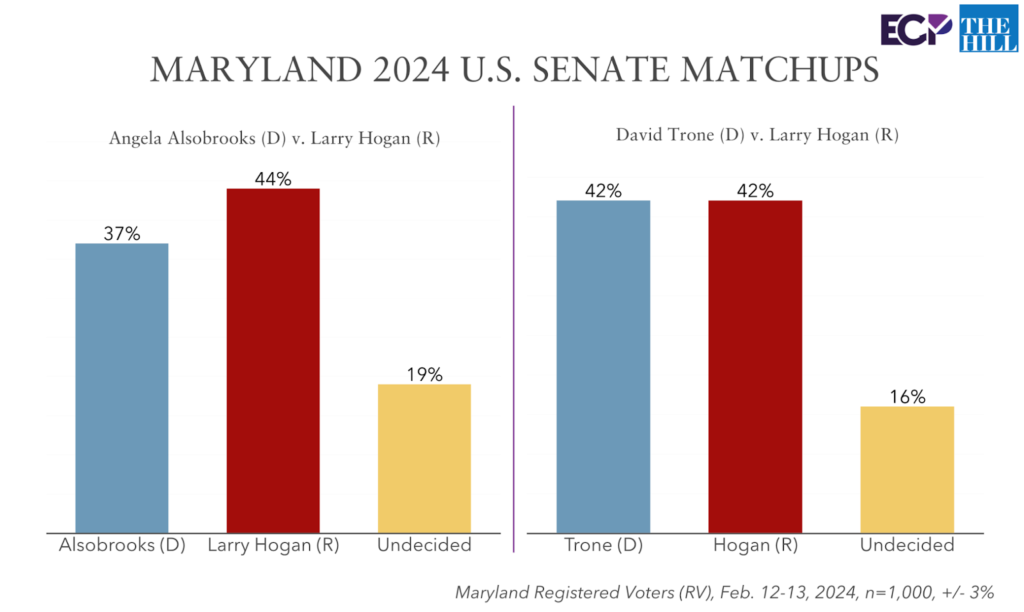
Those general election numbers are clearly a horrific result for Democrats in a blue state race for a seat held for 17 years by Democrat Ben Cardin and held for by Democrat Barbara Mikulski for the thirty years prior to that.
But since that poll, in the first two debates of 2024 (see my writeups of both and also video here; there was only one exclusionary debate beforehand in early December in which I was not allowed to participate), one other candidate besides the two frontrunners—Trone and Alsobrooks—and only one other candidate was quoted by major press outlets after those debates, by The Washington Post and The Baltimore Sun after the first and by The Baltimore Sun after the second (quoted twice, as much as the only other person quoted, Alsobrooks; Trone did not attend): me, Brian Frydenborg. Quickly setting myself apart from the rest of the second-tier candidates in terms of substance and quotability, and with an online presence with more social media followers for my Twitter account than the campaign accounts of Trone and Alsobrooks combined while I was ramping up my campaign, it would seem I could be considered the third candidate in the Democratic primary.
Now, of course, that is open to debate, but think of it this way: media coverage for unknown candidates and for undecided voters is often the decisive factor, as most voters don’t go to rallies or events but read the news to learn about candidates or go to the candidates’ websites after seeing them covered in the news.
I will herein now present an alternative history as food for thought, and then look at what actually has just happened.
What Could Have Been…
Just a few days after that second debate on March 16 and riding a surge of being the only other candidate given serious attention by the mainstream press after Trone and Alsobrooks, The Washington Post/University of Maryland released a poll on March 20 that showed both Democratic frontrunners losing by 12 points or higher to Hogan. But it also showed Brian Frydenborg in clear third place in the Democratic primary, significantly ahead of all the other second-tier candidates even as he was not that close to either Alsobrooks or Trone and with still many undecided voters. Separating himself from that pack, Brian was contacted by several major outlets, including The Washington Post, quoting Brian not just on the state of the race and his concerns with both Democratic frontrunners but also on some of his own positions and experience.
The very next day, the third debate—a bipartisan one—in which Brian participated was held in Baltimore and covered by all the local Baltimore television stations as well as multiple newspapers. Neither Trone nor Hogan attended, but Brian’s performance not only stood out for his energy and passion, but his specific command of details and history, in contrast to Alsobrooks, whose performance was fine and with good responses, but was far less energetic and detailed. Brian often got more audibly engaged positive responses from the audience than Angela did, and while some of the rest of the Democratic candidates might have drawn some laughter with humor and antics, none compared to either Frydenborg or Alsobrooks in terms of giving substantive, direct, and knowledgeable answers to the questions asked. It was the two of them and everyone else far behind, but the relatively unknown candidate Frydenborg not only held his own against the county executive frontrunner, but exceeded her performance. His passionate framing of the failings of the two-frontrunners’ campaigns, the Democratic Party organizations and allies in Maryland, and the media with its general lack of coverage in producing a situation where Democrats are losing badly Republican opponent in the race to succeed Ben Cardin in the U.S. Senate. In contrast, Alsobrooks gave relatively normal answers and projected unreassuring confidence for a potential matchup against Hogan for someone who was down 14 points to him in a blue state.
The media writeups and television coverage of the event—all the local Baltimore stations and papers with some of that coverage spreading—all of sudden introduced a new candidate more forcefully to primary voters besides just a few quotes in a few articles, a candidate who was articulate, passionate, and able to discuss the issues in detail while also giving voice to their anxieties about the state of the race and of potentially losing Cardin’s Senate seat to Republicans. Thus, profiles in papers and television interviews followed, and while the next poll out still showed Brian significantly behind Trone and Alsobrooks, he had still risen even further and was clearly the only other candidate making waves, clearly establishing himself as the third candidate in the Democratic primary, with a snowball effect of more donations and more media coverage reinforcing each other that ensured his voice was heard and having an effect and keeping his trajectory in the polls an upward one in the weeks to follow.
The Sad Reality Failing Democrats, All Maryland Voters, and the Nation
I said that this was an alternate history. Now for what really happened.
To reiterate—because this is so important—The Emerson/Hill poll had shown that the collective support of all the second-tier candidates (14%) was just 3 points behind Alsobrooks in second place (17%), with more voters than even those supporting first-place Trone (32%) saying they were undecided (37%).
In the fictional history, the next poll included the second-tier candidates: this was the only responsible choice given how much collective support the second-tier candidates had that was so close to the level of support of the number-two candidate in Alsobrooks—the 3-point gap within the 3-point margin of error—and given how the largest bloc of voters in the poll was not supporting any candidate but was undecided. In such a context, any respectable pollster not including the second-tier candidates would be ridiculously irresponsible, but in the real world, that is what was done: the Post/UMD poll was actually released on March 20, as happened in the alternate history, but it excluded all of us second-tier candidates, including myself—the only candidate from that second tier and besides Alsobrooks or Trone tier to be quoted by the Washington Post or Baltimore Sun from the past two debates, as I have pointed out before. And given all that, relative to all the other second-tier candidates, for me there was an excellent chance that I would have risen more than any of them and surpassed all of them to legitimately claim third place then and there in this Democratic primary race. But with not being included at all, it is not possible to know this and not possible for voters to have an accurate, full picture of a potentially volatile contest. So no bounce recorded and no media exposure as a result of such a poll just before my third debate, which could have even partly framed the debate itself.
To make matters even worse, while in my alternate history there was still ample media coverage of the third debate to allow my forceful and stand-out performance to reach the voting public even if I was inexcusably excluded in that latest poll, there was no media coverage in real life: no local sites, no local TV stations, no newspapers, period, (*April 8 update) until, that is, Afro News finally published coverage on April 1, eleven days after the debate; still, better late then never and I was quoted more than Alsobrooks!
“We’ve got to be real about what is coming at us,” said U.S. Senate Candidate Brian Frydenborg (D), during the forum at New Psalmist Baptist Church. “Hogan 50–Alsobrooks 36, Hogan 49–Trone 37, that is not where we need to be as Democrats. What that means is that despite the best of intentions and two quality frontrunners, we are failing.”
For a debate less than two months before the primary and less than six weeks before early voting, this is just an absolute collective disgrace on the part of the local media (*April 8 update) apart from Afro News, and it still should have published its account much earlier.
If you’re disappointed by now, here’s another harsh dose of reality: while the event was organized by the League of Women Voters of Baltimore City (LWVBC), the host for the event was Baltimore’s New Psalmist Baptist Church and they were in charge of the recording and streaming of the event. Before the debate, I asked about the status and quality of the recordings. I was directed to a Pete French, who assured me that the Church recorded all their services and that they were professional quality (I mentioned that previous “official” recordings had sorely missed the mark in quality). He made it clear that an audio, not a video, recording would be made (strange, why not record video, what are we hiding from voters here?) and that no decision had yet been made on whether that recording would be released. I pressed him on this, noting how it would really be a disservice to the public to not share the recording. He declined to explain why they were going about this in such a secretive way and clearly did not feel he had any obligation to offer any further explanation, making it clear he would not say anything further of substance at this point on this issue. I must admit I had a bad feeling about whether or not this recording would be released given his polite yet clearly dismissive attitude; also, days earlier, I had asked if the organizers might offer any rides from the main Baltimore-Penn Station connecting to DC since the Church was on the outskirts of the city and I was coming from DC—about an hour away by public transit from Baltimore-Penn Station, and was told no; when I introduced myself to Farmer, he asked me with an amused and perhaps condescending tone if I was the candidate who has asked for a ride (an Uber had been suggested, which would have been prohibitively expensive, but I eventually learned that Baltimore had a subway and was able to take that out). After this exchange before the debate during the introductions while we were on stage, it was announced that the debate would be live-streamed. I asked one of the staffers for that link to be provided so I could share with all my followers online, and she said she would get that for me. It never came. After repeated inquiries after Thursday’s debate, I learned on Sunday from the Facebook account of LWVBC that the New Psalmist Baptist Church—specifically Pete Farmer—had decided not to release the audio to the public.
Even with the oddness of our exchange I had in-person with Farmer, I was still flabbergasted and deeply offended by this decision, sure for myself, but even more so for the people of Maryland.
They may be a church, but who in the hell did they think they were keeping this debate from the larger voting public? This furthermore went against what the LVWBC website had stated, that “The event will be recorded and made available online”:
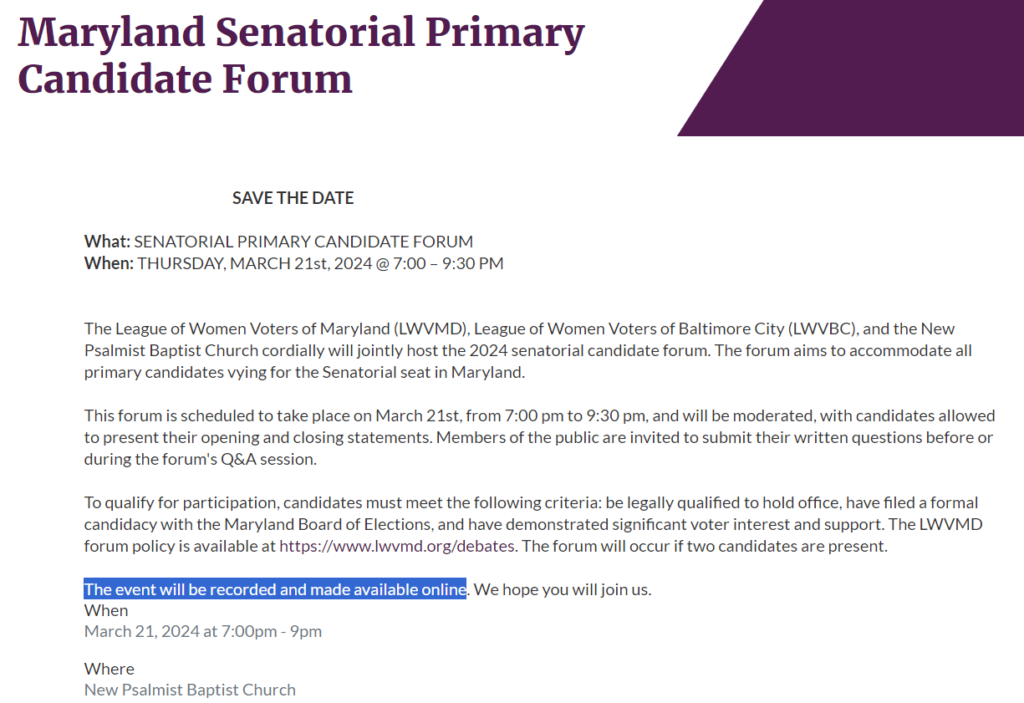
To be honest, though, this triple whammy—a major polling firm making an exclusionary and totally inexcusable decision to not include second-tier candidates despite the results of the previous poll as characterized earlier, literally zero media coverage of the debate (until this piece you are reading now by yours truly *April 8 update: and until Afro News‘s artile eleven days later)), and then the New Psalmist Baptist Church recording the event but then the person in charge of the decision on whether to release the recoding deciding against its release despite my personal entreaties to have them released made directly to him in person—is par for the course for this Maryland Democratic U.S. Senate primary this election cycle.
Fortunately, there is one available unofficial partial video taken by one candidate’s staffer by mobile phone of the debate that is missing most of the opening statements but has the rest (you can hear me speak at 12:36, 28.24, 43:43, 1:01:07, 1:18:11, 1:33:30). You can clearly see that my alternative history description from above is accurate: the only difference from above is that there was no news media coverage (April 8 update: until Afro News eleven days after the event). And the debate was well attended, so there is still a chance for it to have some impact, though because of what I outlined above, that impact will surely be minimal unless somehow my coverage here makes a difference and that video gets a lot of views.
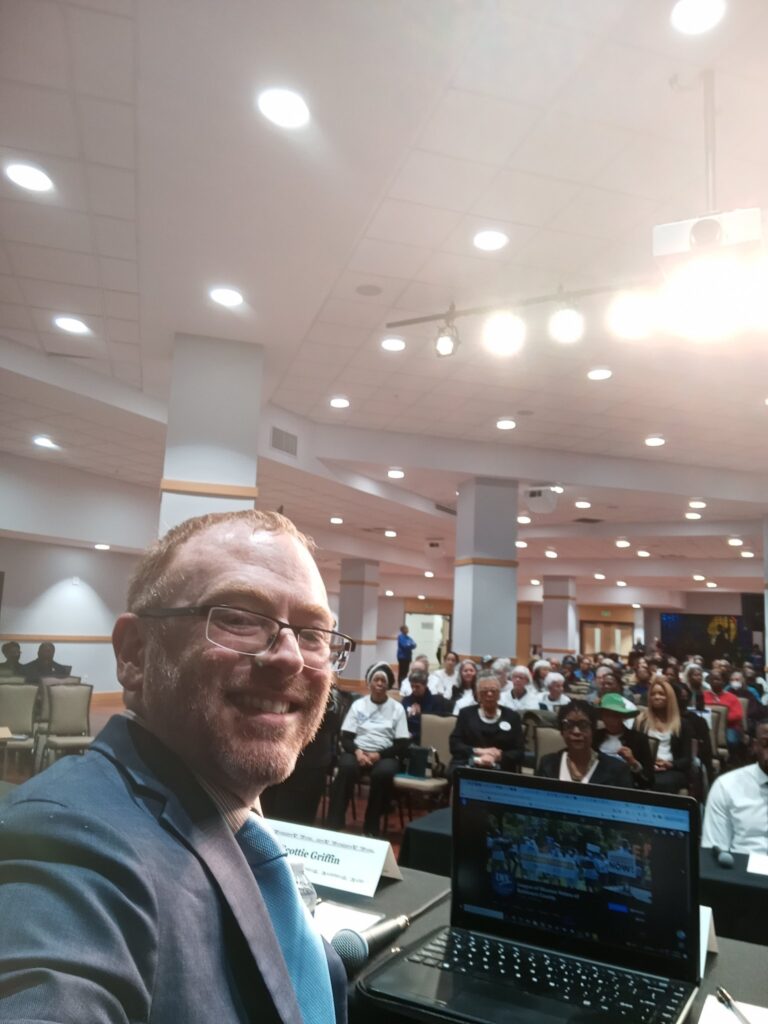
Time for Democrats to Panic and Adjust and Why I am the Solution (Even if You Support David or Angela)
The Problems with Candidates Trone and Alsobrooks
It is mistakes and attitudes like the above that, if nothing changes, make Republican Larry Hogan the favorite to win in November. Yes, here we have two candidate frontrunners and their campaigns running their campaigns in such a problematic way that Hogan is beating them badly and either most or close to most voters don’t even have an opinion on them: 46% when it came to Trone and 58% compared to Alsobrooks, while Hogan had a 64% favorable rating. And when he left office in Maryland in January 2023 not that long ago as one of the nation’s most popular governors for years, a final poll had him with a 77% approval rating, including 81% with Democrats (even matching their approval of Biden), higher than with Republicans (68%). And this was a Republican governor in a heavily-Democratic state! Additionally, his approval was 81% with African-American voters to 76% for white voters.
So here we are heading into a general election with two far-lesser-known frontrunners running far behind the far-more-well-known Larry Hogan: David Trone 12 points behind—49%-37%–and Angela Alsobrooks down 14 points—50%-36%. “Don’t worry, once voters get to know them in the general election, they’ll be fine, plus, we have the abortion issue!” is not just an extremely naïve, hubristic, non-sequitur response, it is incredibly risky and a losing mentality. We have no idea if any of that ground will be made up (I would suspect some would be but hardly think it’s a given that enough of it will be, and though I think Alsobrooks just picking up the endorsement of rockstar Rep. Jamie Raskin—our modern Daniel Webster in the House—will big a serious boost in her fight with Trone it may not be enough to get her past Trone, only time will tell), let alone whether the gap will get worse for either candidate. And abortion rights are not really particularly at stake in Maryland with a 102-39 Maryland House of Delegates Democratic majority, a 34-13 Democratic majority in the Maryland Senate, and with Democratic Governor Wes Moore running the state, not in the way they are at risk in purple swing and Republican-controlled red states with local leaders or extremist right-wing courts trying to impose sweeping restrictions on women’s bodily and reproductive autonomy. But that or some other version of “Don’t worry, it’ll be fine” is the dangerous mentality I am hearing from the frontrunners and their supporters.
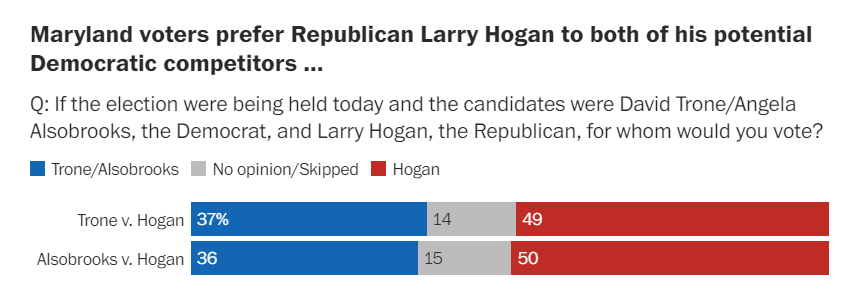
This should be even more worrying when one consider that certain key parts of the base will be less than enthusiastic about supporting an old white guy who was a billionaire retail alcohol mogul for decades before entering Congress just five years ago or a former county prosecutor with what especially some on the left would view as a controversial record in that role. And neither have the stature or big-time political experience Ben Cardin had in 2006 or Larry Hogan has today. These and other weaknesses are being ignored or denied, and not testing the candidates on these grounds before Larry Hogan would challenge them on in a contest that would involve many Republicans and independents, not just Democrats, is a plan for failure and losing. As I noted in my concluding speech, Obama was a much better candidate having faced off against Clinton in 2008 before he went up against McCain. We need a third person in this race to toughen or hone these Trone and Alsobrooks into being much more competitive against Hogan or consider an alternative. I can play both roles better than anyone else among the second-tier Democratic candidates in this race.
Trone may have way more money than Alsobrooks, but she had raised just under $5 million before last quarter’s reporting date at the end of 2023, no small amount. I can promise you that if I had $5 million, this would be a very different race with a very different feel.
The Problems with the Maryland Democratic Party and its Affiliates
As I have noted before, the Maryland Democrats’ plan has failed thus far and needs to change dramatically. If I was involved in the Maryland State Democratic Party, my plan would have been and for the rest of the primary is now simple:
- Encourage every organization sponsoring any primary debate or candidate forum to reach out to all other Democratic Party organizations in the state to cross-promote and cross-post about all these event on their pages and social media.
- I would also ensure all local papers, local news sites, and local television stations would be listing all these events well-ahead of time and prominently as a matter of public interest.
- I would engage national- level outlets, especially The Washington Post, in addition to C-SPAN to engage in much more coverage.
- I would have the state party interview each and every Democratic candidate and post video on our site, YouTube, and social media, as well as transcripts.
- I would have the state party during these final weeks organize two to three more debates in the final less-than-two months of the primary. The questions would not just be about issues but also the candidates’ possible weaknesses and their strategies to win against Hogan. I would include all candidates for at least the first one or two debates, pay to commission an independent and respectable non-partisan poll or two from a major pollster, and have some sort of polling cutoff based on non-partisan polling available (right now, just two polls) for the final debate or two. I would find a way to get these televised live on public access television, perhaps C-SPAN, and definitely streamed online live and posted online after. They would not be amateur, cell-phone quality, or inaudible or unintelligible as has been the case thus far.
- I would have the state party provide assistance to any involved or sponsoring organization to further all these ends.
The insanity here is that all six of these are no-brainers and should have been happening on some level partly since late in 2023. There is no excuse for the lack of coordination, cross-promotion, and not properly recording all these debates/forums and not properly making them publicly available on the internet, period.
The Problems with the Media
And as a journalist, I for damn sure wouldn’t depend on outreach to know about these events and cover them. I would prioritize coverage of these events, make sure they are listed in an “upcoming events” section within the politics section with links to the event pages, and sure as hell not let a situation occur like what happened with the last debate when it was not covered at all. Lost pets, fraternity hazing, and traffic accidents are not more important. If outlets are short-staffed, bring on some interns if necessary to cover, but have someone there covering no matter what for every single primary debate (plenty of college kids can at least sit and take notes). There should be alerts in the days before on the news organizations’ homepage, and this should be especially prominently featured on the homepage up top on the day of the event.
All this is so absolutely basic that it shouldn’t need to be said, anything less is gross negligence. But this is not happening and so it very much needs to be said, and this is just damn pathetic. This needs to go for all the main local papers and The Washington Post, all the local-interest sites, and all the local television stations. There is no excuse for anything less. And, as I noted before, if you’re a newspaper associated with a poll, you sure don’t exclude second tier-candidates under current conditions for the reasons outlined earlier.
Conclusion: Candidates, the Party, and Media: Help Me Help You Do Your Jobs
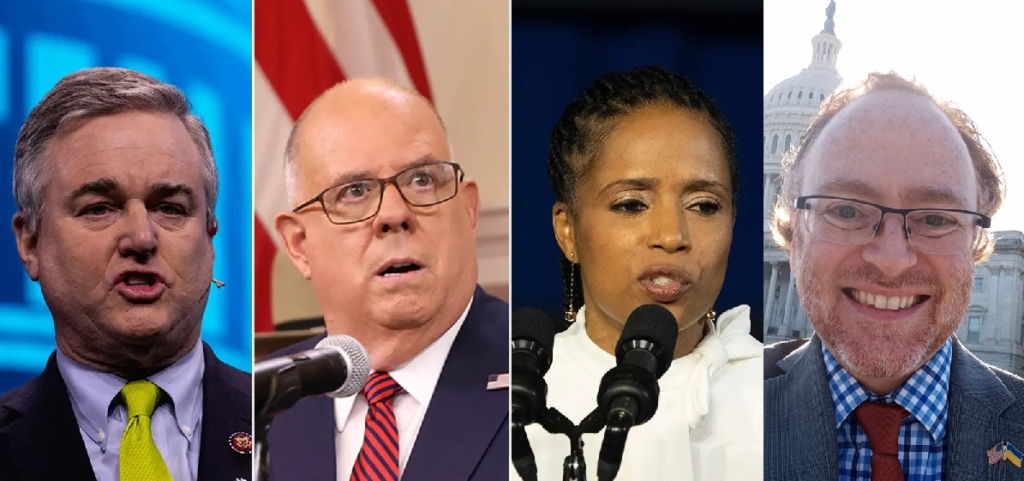
In the end, the top candidates’ jobs are to put themselves in a position that make it the most likely they will defeat their opponents. In the end, the Democratic Party and its allied organizations’ jobs are to promote events as much as possible so as to generate real public and media interest and ensure voters can make informed decisions over months of a competitive primary process that for much of its duration is open and gives all comers a real chance to connect and get their message out to voters and the press, along with making sure the process forges candidates into stronger versions of themselves better equipped to take on a formidable general election candidate if there is such a candidate and, boy, there sure is this time around, clearly much more than was anticipated. Andin the end, the press’s job is to cover all this in substantive ways and to also raise awareness and so that voters can stay informed and not just take candidates’ and the Party’s words without scrutiny and context.
With the polling where it is and factoring all of the above into the equation, it is obvious none of this is happening now. And I don’t see signs of any adjustments or self-awareness that adjustments need to be made. And either they change what they are doing and how they are doing it or Larry Hogan’s odds of winning Ben Cardin’s seat for Republicans will be high, far too high for my liking at a time when having more Democrats to stand up to Trump’s MAGA insurrectionist fascism is essential because the survival of democracy in America itself and the whole post-World War II U.S.-led international order are at stake, under assault from an unholy alliance between Trump and Putin. So no, we cannot afford to have even one of the best possible Republicans in Larry Hogan—in votes, the GOP equivalent of Sen. Joe Manchin (D-WV), breaking often with his party on key issues—to replace Ben Cardin, we need a Democrat.
At the last three debates, I was the only candidate who talked about the frontrunners’ (increasingly) poor polling against Hogan and the major crisis for Democrats in both Maryland and the U.S. Senate this represents. None of the moderators so much as asked anything even remotely related to clear and present dangers this reality presents for Democrats’ prospects in a deep blue state. So I see only one solution to correct course: make me the third person in this Maryland Democratic U.S. Senate primary race so I can light a fire under the ass of all the major actors involved to either forge the frontrunners into being more Hogan-ready than their current 12-14 point disastrous deficits or to present a third alternative if they are unable or unwilling to adjust.
Whichever role I end up playing, me being that clear third person in this Democratic U.S. Senate race in Maryland seems to be the only way to maximize our changes to keep Ben Cardin’s seat blue. The current course and status quo of the press coverage along with the Democratic candidates and Democratic establishment here in Maryland are failing and making it far too likely that Hogan and Republicans will win. I am the only Democratic candidate willing to admit this, let alone call for action to address it and be a leader by acting accordingly. I therefore deserve to at least be the third candidate in this race and be part of the discussion from now until May 14, not for my sake, but for all our sakes and for the sake of a Democratic victory in November.
But I need your help to make this happen. Even if you support Rep. David Trone or County Executive Alsobrooks, they are not currently on a path to beating Hogan or even close, they need help and need someone to push them to be better. And like it or not, there is no other candidate that can do that in this race at this time besides me. So please support me, spread the word, and donate to my campaign for the sake of the party and keeping Ben Cardin’s seat blue to better fight against Trumpist MAGA insurrectionist fascism in Washington, the most important fight that must take precedence before all others. Hogan is a nice guy, not a fascist nor an insurrectionist, but he will still vote too many times with those who are, and that is why we must defeat him, and that is why I’ve got to be the third person in this race.
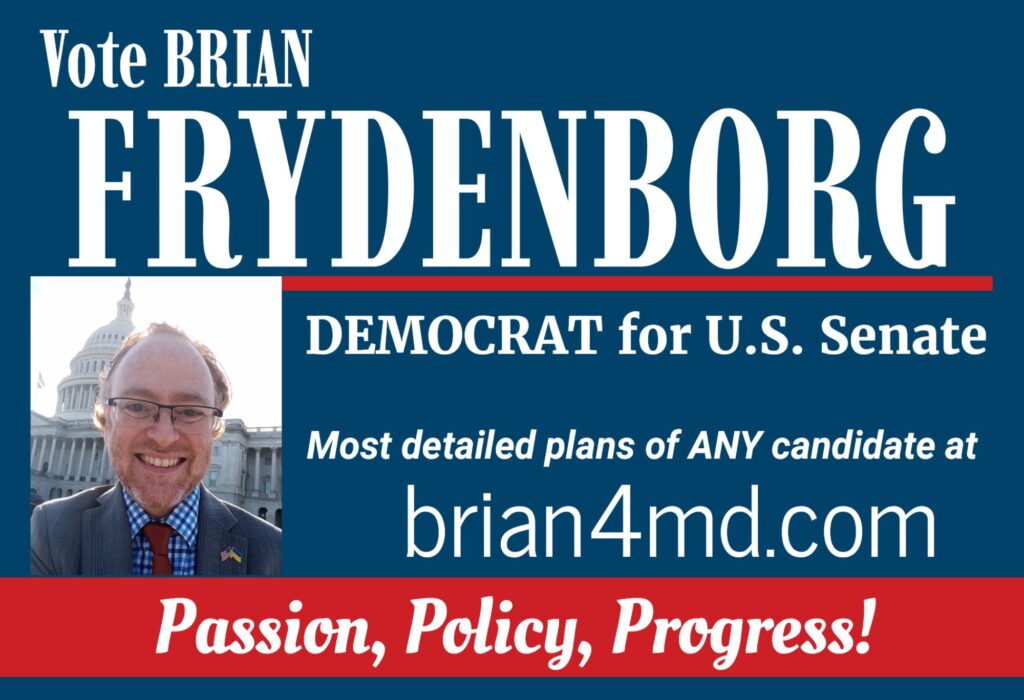
See related articles Frydenborg Holds His Own Against Alsobrooks in Baltimore Maryland U.S. Senate Democratic Primary Debate, but Will It Matter & Why Won’t Local Media Cover this Race Properly?, Maryland U.S. Democratic Primary Debate Raises Questions on Frontrunners’ & Party’s Readiness to Take on Hogan. Can Frydenborg Emerge As Third Option? and Petty Feuding Between Trone and Alsobrooks Does Not Honor Ben Cardin’s Legacy. Vote for Me Instead! And see all of Brian’s Maryland U.S. Senate race coverage here as well as Brian’s official campaign website.
© 2024 Brian E. Frydenborg all rights reserved, permission required for republication, attributed quotations welcome
Also see Brian’s eBook, A Song of Gas and Politics: How Ukraine Is at the Center of Trump-Russia, or, Ukrainegate: A “New” Phase in the Trump-Russia Saga Made from Recycled Materials, available for Amazon Kindle and Barnes & Noble Nook (preview here).
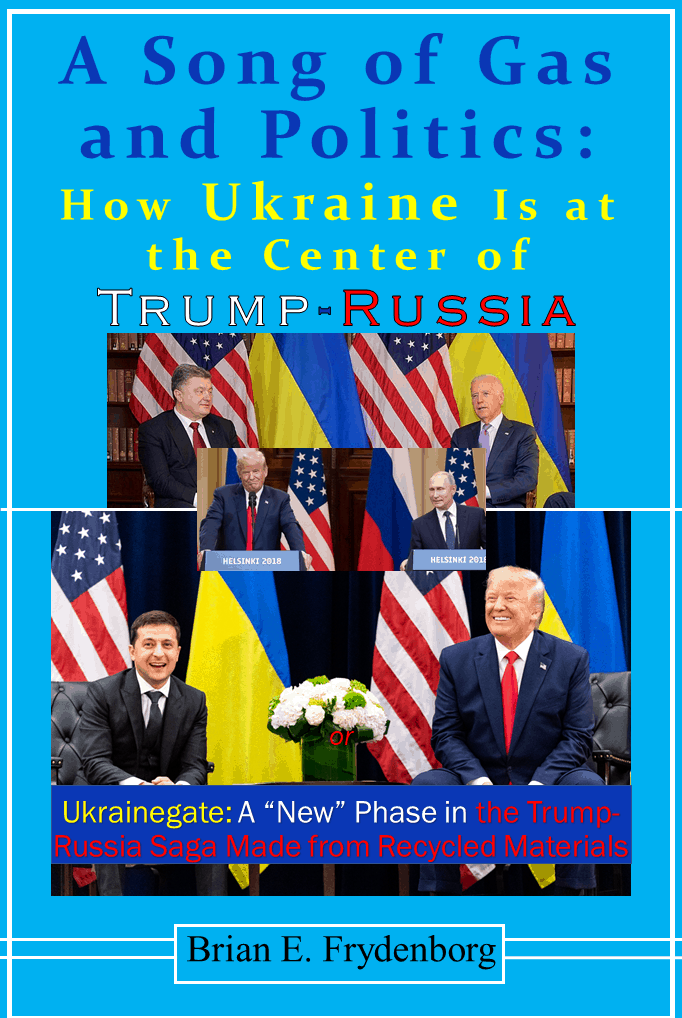
If you appreciate Brian’s unique content, you can support him and his work by donating here; because of YOU, Real Context News surpassed one million content views on January 1, 2023. Real Context News produces commissioned content for clients upon request at its discretion.
Feel free to share and repost this article on LinkedIn, Facebook, Threads, and Twitter. If you think your site or another would be a good place for this or would like to have Brian generate content for you, your site, or your organization, please do not hesitate to reach out to him!